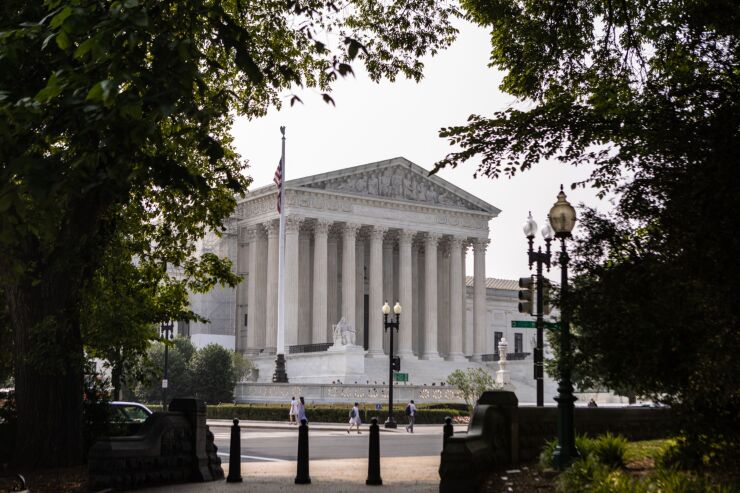
A bank industry trade group is calling on the Office of the Comptroller of the Currency to resist calls for the agency to revise its rules on when federal law supersedes overlapping state law, saying the status quo is the correct interpretation of the statute.
The request, submitted in a letter to OCC acting Comptroller Rodney Hood Wednesday, directly rebuts a
"Respectfully, CSBS's assertions appear to rest on misinterpretations of legislative history, regulatory text, and case law and overlook the importance and structure of our nation's dual banking system," Hugh Carney, executive vice president of Financial Institution Policy & Regulatory Affairs at the ABA, said in the letter to OCC. "Congress prudently did not, as part of Dodd-Frank, require that all OCC preemption determinations include a nuanced Barnett analysis."
Preemption is a legal concept grounded in the supremacy clause of the U.S. Constitution, which establishes that federal laws generally override conflicting state laws. The National Bank Act — which established the national banking system and the OCC, which regulates nationally chartered banks — provides the legal foundation for occasions where federal law overrides certain state statutes that would apply to nationally chartered banks operating in their state. The OCC has historically interpreted its preemption authority expansively, holding under its most recent 2011 guidance that state laws are generally preempted if they conflict with a national bank's ability to exercise its federally authorized powers.
Section 1044 of Dodd-Frank codified a standard for preemption in bank regulatory matters that was established in the Supreme Court's
The CSBS urged the OCC to rescind its 2011 preemption rules, arguing they are legally flawed, anticompetitive and in conflict with Supreme Court rulings and Trump-era executive orders. They argue the OCC's current interpretation oversteps its statutory authority by broadly overriding state laws without properly applying the "significantly interferes" standard established in Barnett Bank and codified in Dodd-Frank. A spokesperson for CSBS was not immediately available to comment on the letter.
Banking experts
The bank trade group counters that federal authority should preempt many state laws — in line with the OCC's existing interpretation — given the long-standing precedent for broad preemption. While CSBS argued the OCC's interpretation violates the Barnett standard, the ABA argues the "significantly interferes" standard is only required in specific cases.
"[Dodd Frank preemption standard] does not require that OCC engage in any case-by-case analysis when determining whether an individual or type of state consumer financial law is preempted by a provision of federal law other than [foundational banking laws]," the ABA wrote. "OCC's Final Rule is comprised of common-sense preemption determinations relevant to 12 U.S.C. §371, which authorizes national banks to engage in real estate lending and which is not part of [the National Bank Act]. Therefore, OCC was not obligated to engage in a Barnett analysis or any other kind of case-by-case analysis before making any preemption determinations comprising the Final Rule."
CSBS also argued in its letter that recent executive orders promoting fairness and competition require rescinding the OCC's preemption rule, claiming it unfairly advantages national banks. The ABA counters that the orders don't call for reversing well-established regulations and warn against hasty changes that could create regulatory uncertainty. They add that most U.S. banks are state-chartered, saying this demonstrates the dual banking system remains competitive and balanced. Rescinding the rule, ABA warns, would undermine this system by subjecting national banks to a patchwork of state laws, limiting their ability to do business at a national level.
"Accepting CSBS's assertions at face value risks overlooking longstanding historical and economic considerations," ABA said. "Such invitations are not only inherently improper but dangerously disregard the importance and structure of our nation's dual banking system, which makes our economy the envy of the world."






